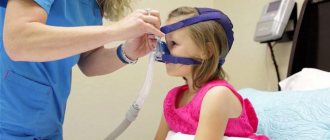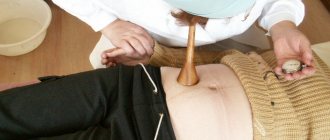What are the chords in the heart?
Chords in the heart are divided into 3 types:
- Natural - those that are laid down by nature to ensure normal functioning of the heart. They help the valves contract and move blood around the body. They also have the function of protecting against valve sagging with age.
- Abnormal - additional chords, which are divided into some subtypes and create some obstacles to the normal functioning of the cardiac organ.
- False chord in the heart - when listening to the heart, murmurs may be detected that are mistakenly taken by the doctor for chords, however, upon further diagnosis they are not detected, and the murmurs appear as a consequence of another cause.
An abnormal chord in the heart can be divided into the following subtypes:
- right ventricular chords – about 5% of cases;
- left ventricular chords – about 95% of cases;
- single – 70%;
- multiple – 30%;
- diagonal;
- longitudinal;
- transverse;
- apical;
- middle;
- basal;
Correctly determining the type of additional chord is of great importance for the patient, since different types of chords can bring different inconveniences in human life.
In the course of their research, experts divided the existing chords into 2 categories:
- Potentially dangerous;
- Safe;
Patients whose pathologies belong to type 1 chords should be under the supervision of a doctor and undergo periodic examinations.
For example, single longitudinal chords in the ventricles of the heart do not create obstacles to the normal functioning of the cardiac organ, but if the chord is located transversely, it can significantly impede the normal outflow of blood.
Multiple chordae should be under the supervision of a cardiologist in order to begin treatment of the pathology in a timely manner, if necessary.
What are the types
All chords in the heart can be:
- hemodynamically significant - affect blood flow and can cause problems in the heart;
- hemodynamically insignificant - do not affect blood flow. Currently, it is often referred to as a variant of the norm.
Extra chords in the heart can be located:
- longitudinally;
- transverse;
- diagonally.
Types of chords in the heart
Symptoms accompanying an abnormal development of the heart
There are several possible reasons when a child develops a chord of the left ventricle of the heart during intrauterine development.
These include:
- a hereditary factor, when one of the child’s parents also has extra veiny formations inside the heart, most often transmitted through the maternal line;
- Improper lifestyle of the mother - the use of drugs, alcoholic beverages or smoking tobacco products can negatively affect the development of the fetus. Especially if these factors took place at 5-6 weeks of pregnancy, when the baby’s heart muscle is actively forming;
- unhealthy diet with excessive amounts of animal fats;
- heavy physical activity on the pregnant body;
- intrauterine infections in the fetus;
- reduced maternal immunity in the first trimester of pregnancy;
- living in a contaminated region (chemical and heavy industry waste, increased background radiation);
- frequent stressful situations that have an impact on the nervous system and psyche;
In order to bear and give birth to a healthy child without developmental pathologies, it is necessary to protect yourself in every possible way from the influence of negative factors that may have an impact on the formation of the child.
To maintain the normal functioning of a person with abnormalities in the development of the heart muscle, it is necessary to observe the following lifestyle:
- from childhood, harden the body, this is useful not only for strengthening the cardiovascular system, but also for the prevention of acute respiratory diseases, strengthening the overall endurance of the body;
- maintain proper nutrition high in vitamins, microelements and other beneficial contents. Reduce the amount of fatty, salty and spicy foods you consume;
- establish a daily routine - devote enough time to sleep (at least 8 hours a day, for children to take naps during the day), replace work with rest, alternate mental and physical work;
- start the day with morning exercises or engage in vigorous physical exercise throughout the day;
- take regular walks in the fresh air;
- completely give up bad habits - smoking and drinking alcoholic beverages;
- if possible, eliminate or reduce the number of stressful situations that affect a person’s psychological state;
- regularly take courses in relaxing therapeutic massage;
- engage in the prevention of infectious diseases;
With a mild degree of pathology, you can lead a normal life without denying yourself active hobbies and sports. However, an additional chord and an army are incompatible concepts, since they involve great physical activity, which is contraindicated for this pathology.
Experts classify the formation of an additional chord in the heart as a minor pathology, which in most cases does not require drug treatment or surgical intervention. In general, the forecast is quite positive. However, it is still necessary to monitor the development of the disease, sometimes visiting doctors and performing control diagnostic measures.
Common causes of anomalies of the notochordal apparatus in a child include:
- Hereditary factor (the gene responsible for the anomaly is mostly transmitted to the child from the mother);
- Use of drugs, alcohol and nicotine by future parents;
- Severe stress;
- Infection of the fetus in the uterus;
- Poor nutrition;
- Weak immune system of mother and child;
- Unbearable physical activity.
Pathology of the heart muscle develops in the first trimester of pregnancy.
The basis of therapy is taking medications:
- Vitamins to support the immune system;
- Magnesium and potassium;
- Antioxidants (used for treatment and prevention);
- Neurotropics (affect the functioning of the central and peripheral nervous systems).
The specific medicine is chosen by the doctor.
Any physical overload is contraindicated. It is necessary to promptly treat infectious diseases and strengthen the immune system. The child should be in a supportive environment; stress and emotional outbursts can negatively affect the heart rate. After an emotional shock, the heart can be seriously damaged.
An accessory chord of the left ventricle has been frequently diagnosed recently. The anomaly has not been fully studied. Doctors argue about its effect on the body, and the pathology itself is considered hereditary.
The heart is an internal organ consisting of four chambers. Additional formation in the left ventricle is a hereditary pathology that is transmitted predominantly through the female line. The formation of the disorder is intrauterine. The main reason for the manifestation of deviation is a failure in the development of connective tissue.
Women with an anomaly are recommended to have their child examined for pathology in the first year of life. Doctors consider the following to be provoking factors for the development of deviations:
- smoking and dependence on alcoholic beverages;
- regular psycho-emotional stress.
Provoking factors must be completely excluded at the time of pregnancy. Otherwise, the risk of an anomaly increases. An additional chord in the left ventricle is a significant deviation. A patient with pathology should be observed by a cardiologist throughout his entire life.











